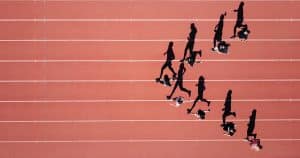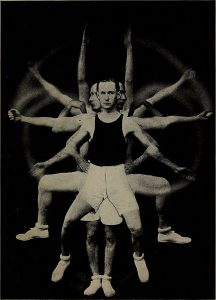The three kinds of performance intelligence: mind, body, and emotion
Every week, I work out with my trainer Joe Farese. Joe is an exercise coach, who also happens to be an award-winning amateur body builder.
While I’m not looking to bulk up myself, his experience as a body builder has taught him many important lessons about the human body that he passes on to me. I always thought the brain was the most intelligent part of the body. But after 15 years of physical training with Joe, I’ve learned that the body has its own intelligent strengths.
There is an important distinction between mind intelligence, body intelligence, and emotional intelligence. And understanding these distinctions will help you become a better on-camera performer.
The Mind Makes Conscious Choices
Mind Intelligence is your common sense, knowing what is right or wrong. It’s the conscious processing of information that helps you make decisions. When I work out with Joe, I use Mind Intelligence to choose an exercise based on the outcome I want to see. I love Mind Intelligence.

We consciously use Mind Intelligence to prepare for an on-camera performance. Before your on-camera performance, you decide what your target audience is for the video. You practice distilling your message down to the key points. You pick the right outfit to send the right visual message. Your Brain Intelligence allows you to think through choices and make good decisions.
But after a good, tough workout, Joe often asks me, “How does your body feel?” This is not a question I can answer with logic—the same workout that feels great on one day may leave me winded on another. This is where body intelligence comes into play.
The Body Knows Its Own Performance Limits

Body intelligence is your gut feeling. It’s what subconsciously reacts to your senses, and lets you know that something’s not right. It’s what stops you from doing one more repetition of an exercise, the one that might cause an injury.
It took me a long time to understand body intelligence. After 15 years of training, I’m now understanding not just the physical limits of the body—I’ll never be a champion amateur body builder—but how that plays a major role in video performance.
As a leader, the gut feeling plays heavily into your day to day. You have to listen to your body intelligence when making stressful decisions. Your body picks up on things your mind overlooks.
Trusting Your Gut In Performances
Body intelligence and authenticity are intrinsically linked. When you truly know and resonate with your message, your body sends outward signals to convey that message. It’s immediately obvious to an audience when someone gives an insincere apology. But when the body and message are aligned, the performance feels more real to the viewer, and this establishes trust.
The ability to deeply understand your message, whether it’s positive or negative, is where emotional intelligence comes into play.
Empathy Ties Your Video Together
Emotional Intelligence is often labelled as empathy, to understand the right ways to approach a situation. Someone with high emotional intelligence understands the subtle nuances of others’ emotional expressions.
Emotional intelligence is what differentiates someone from being an exercise instructor or an exercise coach. Anyone can tell you to walk a mile, do thirty pushups, eat more greens. But a coach with high emotional intelligence helps shape the way you think and feel about your physical wellbeing.
In the same way, a great director will guide you through the shoot, coaching you to look, sound, and feel your best. Their emotional intelligence will help shape you as a performer—and your emotional intelligence will allow you to grow into the performer you can be.
Whether you’re on camera alone, shown with an interviewer, or as part of a group, your emotional intelligence will also help you determine what to say and how to say it. It’s what informs your body on nonverbal language. Which is connected to your body intelligence…and your mind.